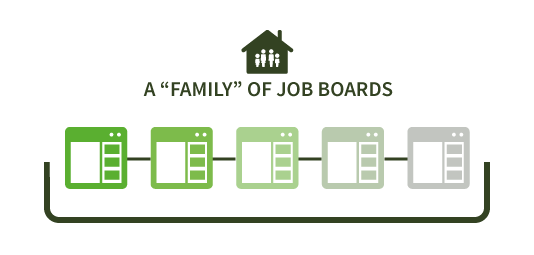You’re in the job board business, or you want to be, and you’re thinking big. One job board isn’t the limit for you, and you like the idea of multiple job boards working together. But how does that work in terms of technology, not to mention your business model?
This week and next, we’ll simplify the problem by looking at two possible scenarios or arrangements. But before we dive in, I want to highlight some themes to keep in your mind at all times when considering a multi-board arrangement:
- Business Partnerships: working with other sites/businesses.
- Data Ownership: customer and candidate data.
- Technical Connections: you don’t need to know how to build it, but you should understand the basics of your set-up.
- User Experience: Never forget about the experience of the user, be it customer, candidate, or yourself.
Now let’s have a look at one scenario, affectionately called a “family” of job boards, sometimes known as a parent/child set-up.
SCENARIO 1: FAMILY MATTERS
You’re finding a lot of success with your job board and are looking to duplicate (or triplicate/quadruplicate/etc.) that success with more job boards.
HOW DOES THAT EVEN WORK?
Your job board has data. Employer/recruiter accounts and job seeker accounts (which includes stuff like logins, profiles, unlocked candidates, and application history), and jobs. All that info lives in a database that is owned by you.
A family of job boards shares all its data on the same server and web hosting instance, like it’s living in the same house and storing, cooking, and eating food in the same kitchen.

WHAT’S MY BUSINESS MODEL?
You own all the boards and their data, and operate them together as one business. This works best when all the job boards list jobs within the same industry or similar niches, or when all the boards feature the same types of jobs, but each job only lists those in a specific region. Let’s say your family of four job boards focus on sales jobs, and include “West Coast Sales Jobs”, “East Coast Sales Jobs”, “Sales Jobs Canada”, and “Sales Jobs Europe”. All the boards are the same in style and function, but are individually branded.
Think back to our family of job boards living in their house, sharing a kitchen: if each job board is defined by its geography, it’s as though each job board has its own room, with its own domain name and branding.
WHAT’S THE USER EXPERIENCE?
A job seeker or employer/recruiter can create an account on “West Coast Sales Jobs”, and login on “East Coast Sales Jobs” to find their same account with all its data. Similarly, if you search for jobs with European locations on “Sales Jobs Canada”, the search results will be able to pull from the positions listed on “Sales Jobs Europe”.
When a user creates an account on any site within the family, it’s as though they’ve created a skeleton key, giving them access to every room in the house.
Stay tuned next week, where we go over an alternate scenario for linking multiple job boards together.

